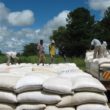The Center for Trade Policy and Development (CTPD) says the Food Reserve Agency (FRA) has set a low market price for maize because of the bumper harvest in the region.
In an interview with News Diggers!, CTPD Executive Director Isaac Mwaipopo noted, however, that the price would only benefit consumers.
“The price set by the Food Reserve Agency with regards to the purchasing of maize grain is a direct response to the prevailing market price for the commodity. This follows the depressed prices for the commodity resulting from the bumper harvest that has been recorded in most of the countries within SADC. However, the Center for Trade Police and Development (CTPD) thinks that the price that has been set will actually disadvantage most of the small scale farmers especially those that are in the far areas that have had a challenge in terms of finding buyers that would be able to buy the commodity at a price that reflects the cost that they grew the commodity,” Mwaipopo said.
“We have observed recently that there has been a reduction of mealie meal prices as observed from a number of trading or retailing shops which is also a response to the supply side of the commodity. This will actually benefit the consumers but the small scale farmers that toiled and worked so hard to grow this commodity will not benefit anything.”
And Mwaipopo encouraged FRA to buy more maize from small scale farmers in rural areas whom he felt would the most affected this marketing season.
“Going forward, CTPD recommends that there is actually need to ensure that even as the Food Reserve Agency is stepping into the markets to take part in the marketing season for 2017, there is need to ensure that the purchasing is mostly done in places where most of the farmers are disadvantaged. This is also in accordance with the stipulations of the FRA Act and it would actually help to alleviate the challenge that most of the small scale farmers that are living in disadvantaged areas are likely to face in the 2017 marketing season which is going to be a very tough marketing season for most of the small scale farmers,” Mwaipopo said.
Meanwhile, Mwaipopo called on the Zambia Commodity Exchange to introduce sensitization programmes for farmers on alternative crops they could grow in order to diversify the agricultural sector.
“Additionally, there will be need for institutions like the Zambia Commodity Exchange to step in and begin a process of sensitizing most of the small scale farmers on alternative crops that they can be thinking of growing especially those that in the agriculture sector for business not growing commodities for consumption. This will actually go a long way to ensure that there is diversification in the crops that we are growing,” said Mwaipopo.
“Secondly, as we are budgeting for 2018, there will be need for the government to consider embedding within the budget support that can go towards supporting extension service work. This will help to ensure that the extension service workers have got operational funds that would allow them to interact with the small scale farmers and provide information that would provide the small scale farmers plan better.”











